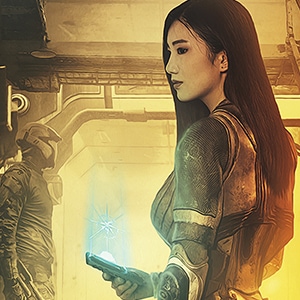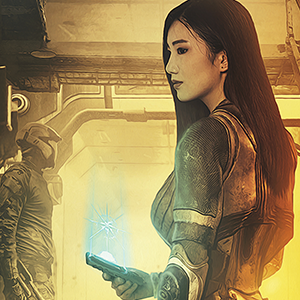She kept replaying it in her mind. The Shadow-man stepping into sight. The way his shoulder had turned briefly translucent in front of the hallway light. The subtle lock of his head turning toward her, and the solid rush she’d felt when his attention had met hers. Running. Blips of pain and near-stumbles. The rock and sway of the hallway. The heady rush to the elevator. Sparks crashing from where one of them had hit an overhead cable, revealing the crawling sea of Shadow-men racing below.
Back-up had come. About ten minutes after that one soldier—she still hadn’t asked his name—had called, two squads had come, not through the elevator but up the halls from a different junction. Worried that the Shadow-people could work the elevator controls, the four of them had set her equipment bag between the doors, preventing them from closing and it from leaving.
It was still there, too. As soldiers milled around her in the hallway and talked over her head, she realized she was staring at it. Every now and then the elevator would ding a little warning and try to close, only to jolt back when it hit the bag.
After a while, she became aware of someone calling her name. She turned her attention back to the soldiers. The other soldier, the one without a name, stood next to where she sat on the floor, his gaze turned down to catch hers when she looked up. To his left, the other squads’ commanders—were they even called commanders? She had no idea about military ranking—watched her, their expressions quiet and strained.
She cleared her throat. “I’m sorry. What did you say?”
“We’re going down to Harbin to find out what happened to Preston’s group. Would you come down with us and check the lights?”
It took a few seconds for her to process that. Down the hall, the elevator tried to close on her equipment bag again, a warning ding accompanied by the double-clunk of engaging and reversing motors. Images of the sub-level flashed through her mind again. She gave a delayed grimace. “I can’t say I’m too excited by the prospect.”
“I know.” The soldier’s face had a passive expression, all professional. There’d been fear, before. Panic. They’d all been scared—and for very good reason. If she looked hard enough, she could see the echoes of that fear behind his eyes.
Perhaps seeing something similar in her, the soldier shifted and cleared his throat. “We have infra-red on the corridor. No enemies to be seen. You just need to go in there, do your thing, and get out. One of us will escort you back to wherever you need to go afterward.”
She resisted the huff that threatened her chest—Gods, they’re really desperate, aren’t they? She’d assumed that she’d be able to leave once the back-up arrived, but the problem of the lights still needed fixing. And she had insinuated that she’d needed to go down there and test the bulbs themselves in order to backtrack the problem.
“Or, if you’re unwilling to go, you could teach one of us how to do it.” One of the commanders to the left spoke up. Though he kept his tone polite and professional, carrying the distinct upper-level accent that defined him as a planet-born transfer rather than a native station dweller—from the Yamato institutions, if she had to guess—a hint of derision flickered across his face, and the line of his mouth came across as too tight, as if it were forced. “I’m sure we can manage.”
He needn’t have bothered with the tone. As soon as his words hit her ears, they snapped the fugue she’d been in. The engineer in her woke up.
Clio, a soldier handling the filament-test? They were liable electrocute themselves—not to mention they might fudge it up. Though her internship had been just a year, she had spent well over four times that long fiddling around with varying station electronics. Even if they could manage to test the filament, they still lacked the knowledge of where to go from there. If power wasn’t running through the filament, they’d have to backtrack through the socket, then perhaps through the wall, which would require knowing how to take the panel off-they could probably manage that part—and figuring out how to read the circuit code so that they know where it went.
Plus, some of the bulbs had weird pressurizations and a tendency to implode if banged around too much outside of their housings.
But she wasn’t going to say all that. Even with her mind flayed out on the weird post-traumatic-stress-sleep-deprivation bend it was on in its current state, she had more tact than that.
“No, I think it’ll be faster if I go down there.” Her upper spine gave a small, subtle series of pops as she un-hunched her back and levered herself back to her feet. As the men drew back to give her space, she made a vague gesture to where the door was closing on her equipment bag again. “So—elevator or stairs?”
***
In the end, the Shadow-men turned out to be a non-issue. When they arrived on Harbin level, the entire group bristling with flashlights and readied blasters as they poured out from the stairwell landing, the immediate corridors were empty. Sixteen men spread out to cover the three possible approaches, including a few set to watch the ceilings and vents for potential drop-ins—which led to about three minutes of tense silence as she found a light array she could reach, dismantled its faceplate, broke the interior bulb, and touched her ampere monitor to the exposed filament.
Energy spiked on the readings. Not a lot of energy, but enough to fall in line with what she remembered of the wattage for under-lighting.
Which meant that the filament was still functioning.
“Look, see this?” She made a gesture to the commander who’d spoken with her earlier—Saul Rubensohn, who was a captain, not a commander, as was Keldan Reynen, the other one. “The power’s flowing through here, it’s just not showing.”
“Why isn’t it showing?”
“I have no idea. It should be. They all should be,” she made a gesture to the rest of the dark corridor. “It’s not broken.”
As his brow furrowed behind the faceplate, she realized she was referencing a bulb that she had indeed just broken the glass off. “Functionally, I mean. Here, I’ll test another.”
She gave the next bulb in the line a careful whack with the small wrench she’d brought out just for such a purpose and touched the monitor to the new filament. Again, the readings spiked. “See? Functioning.”
Captain Rubensohn remained silent. The furrowed look on his face didn’t change.
“So,” he said after a few seconds. “You can’t fix it?”
“As far as my instruments tell me, there’s nothing to fix. And yes,” she put up her hands to forestall his next reaction, “I realize how ridiculous that sounds with us standing in the dark.”
He stewed on that for a few seconds. “So what can you do?”
She didn’t wince. In her internship, some of it spent dealing with clients that Yamaguchi didn’t like, she’d heard worse, and she could understand his frustration—she, too, would like nothing more than to flip the grid reset switch, have everything turn back on, and dust her hands of the whole scenario—but that would be magical, and apparently only the Shadow-men had access to that.
“Nothing that’ll likely fix it. I’ll take some of the bulbs back to Curlew. If they turn on there, we’ll know it’s a location thing. If they don’t, I can find something to test the bulbs themselves and see what comes up.” She wasn’t sure if Curlew had the equipment for that kind of testing, but if it got to that point she could call up some of Curlew’s sister companies. Yamaguchi had made friends with most of those who worked Tianjin’s grids and many others who’d gone into more-specific enterprises. Someone would have an idea of what to do.
Another quiet filled the hall. After a few seconds, Captain Rubensohn drew back and exchanged a glance with the other captain across the hall.
“All right, do it,” he said. “But hurry up. We need to find our people.”
Right. Pardon me while I just remove some live bulbs with exposed filaments. No pressure at all. Putting her tools away, she squatted down and resisted the urge to roll her eyes—definitely not the right move to make if she wanted to stay tactful. She rested the wrist of Yamaguchi’s bulky glove on the edge of the ridge that had held the faceplate in place, got a decent angle on the bulb’s base, and gave it a yank. She repeated the process for the first one, then transferred them to her left hand and took two of the still-intact bulbs along for good measure. She left the faceplate on the floor in case someone needed to come back and test. Not the smartest idea, and definitely not to code, but she was guessing that soldiers weren’t stupid enough to put their fingers into the empty sockets and she doubted they would be letting civilians come down here for a while.
Captain Rubensohn’s gaze followed her as she stood back up, all four bulbs held in her gloved hand.
“Cool,” she said. “Let’s go.”











Comments (0)
See all